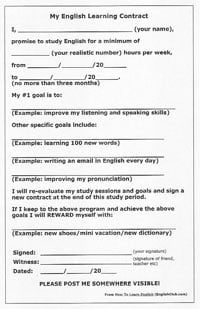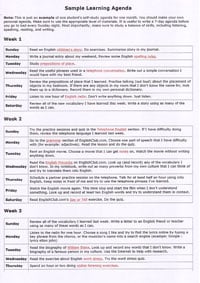How To Learn English!
Here are some tips which may help you to
master the English Language!
Speak without Fear
The biggest problem most people face in
learning a new language is their own fear.
They worry that they won’t say things correctly or that they will look
stupid so they don’t talk at all. Don’t
do this. The fastest way to learn
anything is to do it – again and again until you get it right.
Like anything, learning English requires practice.
Don’t let a little fear stop you from getting what you want.
Use all of your Resources
Even if you study English at a language school
it doesn’t mean you can’t learn outside of class.
Using as many different sources, methods and tools as possible, will
allow you to learn faster. There
are many different ways you can improve your English, so don’t limit yourself
to only one or two. The
internet is a fantastic resource for virtually anything, but for the language
learner it's perfect.
Surround Yourself with English
The absolute best way to learn English is to
surround yourself with it. Take
notes in English, put English books around your room, listen to English language
radio broadcasts, watch English news, movies and television.
Speak English with your friends whenever you can.
The more English material that you have around you, the faster you will
learn and the more likely it is that you will begin “thinking in English.”
.
Listen to Native Speakers as
Much as Possible
There are some good English teachers that have
had to learn English as a second language before they could teach it.
However, there are several reasons why many of the best schools
prefer to hire native English speakers. One of
the reasons is that native speakers have a natural flow to their speech that
students of English should try to imitate.
The closer ESL / EFL students can get to this rhythm or flow, the more
convincing and comfortable they will become.
Watch English Films and
Television
This is not only a fun way to learn but it is
also very effective. By watching
English films (especially those with English subtitles) you can expand your vocabulary
and hear the flow of speech from the actors.
If you listen to the news you can also hear different accents.
Listen to English Music
Music can be a very effective method of
learning English. In fact, it is
often used as a way of improving comprehension.
The best way to learn though, is to get the lyrics (words) to the songs
you are listening to and try to read them as the artist sings.
There are several good internet sites where one can find the words for most
songs. This way you can practice your listening and reading at the same
time. And if you like to sing, fine.
Study As Often As Possible!
Only
by studying things like grammar and vocabulary and doing exercises, can you really improve your knowledge of
any language.
Do Exercises and Take Tests
Many people think that exercises and tests aren't
much fun. However, by completing exercises and taking tests you can really improve
your English. One of the best reasons for
doing lots of exercises and tests is that they give you a benchmark to compare your future
results with. Often, it is by comparing your score on a test you took yesterday with
one you took a month or six months ago that you realize just how much you have
learned. If you never test yourself, you will never know how much you are
progressing. Start now by doing some of the many exercises and tests on this
site, and return in a few days to see what you've learned. Keep doing this and
you really will make some progress with English.
Record Yourself
Nobody likes to hear their own voice on tape
but like tests, it is good to compare your tapes from time to time.
You may be so impressed with the progress you are making that you may not
mind the sound of your voice as much.
Listen to English
By this, we mean, speak on the phone or listen
to radio broadcasts, audiobooks or CDs in English. This
is different than watching the television or films because you can’t see the
person that is speaking to you. Many
learners of English say that speaking on the phone is one of the most difficult things
that they do and the only way to improve is to practice.
Finally
Have fun!
 Sometimes
my cat comes to me and tells me that she is hungry. Or that her leg
hurts. How does my cat tell me these things? I don't speak pussy-cat
language.
Sometimes
my cat comes to me and tells me that she is hungry. Or that her leg
hurts. How does my cat tell me these things? I don't speak pussy-cat
language.
